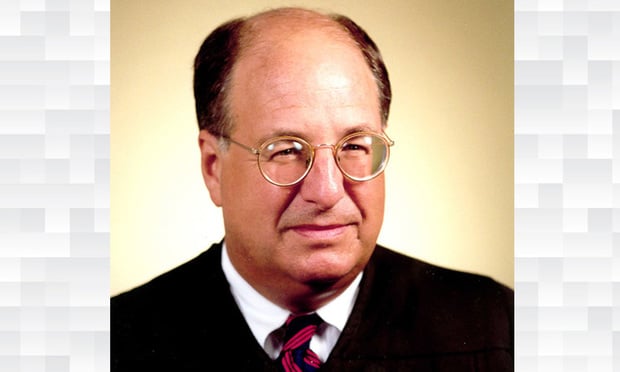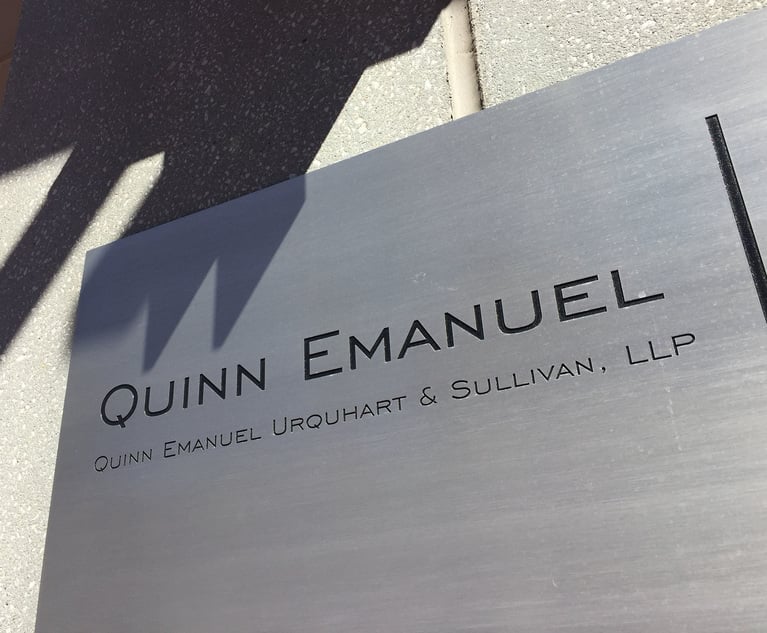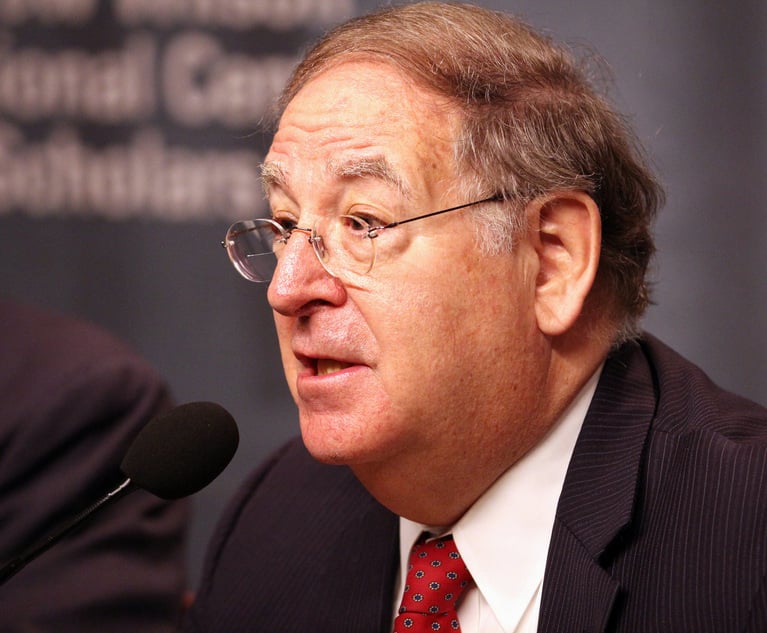Labaton Petitions 1st Circuit for 'Fair and Impartial' Judge in State Street Case
The New York firm is objecting to a special master's report that found Labaton and two other firms serving as class counsel in the case had deliberately misled the court about how they planned to distribute $75 million in attorney fees.
July 17, 2018 at 06:12 PM
6 minute read
 Senior Judge Mark Wolf of the U.S. District Court for the District of Massachusetts/courtesy photo
Senior Judge Mark Wolf of the U.S. District Court for the District of Massachusetts/courtesy photo
Labaton Sucharow has petitioned an appeals court to remove a federal judge in Boston whose questions about possible public corruption in a securities class action case, according to the firm, have raised concerns about his impartiality.
In a July 10 petition for writ of mandamus, Labaton asked the U.S. Court of Appeals for the First Circuit to vacate U.S. District Judge Mark Wolf's order last month refusing to recuse himself from the case against State Street Corp. The New York firm is objecting to a special master's report that found Labaton and two other firms serving as class counsel in the case had deliberately misled the court about how they planned to distribute $75 million in attorney fees.
“Granting this petition and requiring recusal would go a long way to ensure that Labaton gets its day in court before a fair and impartial judge,” wrote Labaton's attorney, Joan Lukey of Choate, Hall & Stewart in Boston. “Denying this petition leaves Labaton to push through potentially protracted proceedings, all before a judge whose impartiality might reasonably be questioned.”
The special master's 377-page report zeroed in on a $4.1 million payment to a Texas lawyer named Damon Chargois who referred Labaton to an Arkansas pension fund, now serving as lead plaintiff. Chargois got 20 percent of the fees but never worked on the State Street case, and Labaton didn't disclose his payment to the court.
Labaton has challenged the report's findings, insisting that the payment was a “bare referral fee,” which is allowed under the Massachusetts Rules of Professional Conduct.
The firm wants a different judge to rule on several of its pending motions, including its objections to the report. In a statement, the firm said “numerous legitimate concerns have arisen casting doubt on the Court's impartiality and ability to make a fair judgment stemming from findings in the Special Master's report.”
Last month, the firm filed a motion to recuse Wolf based on his statements at a May 30 hearing at which the judge questioned the executive director of the Arkansas pension fund about its relationship to Labaton. During a sidebar discussion, the judge hinted at the possibility of public corruption.
But Wolf rejected that motion on June 28. In its petition before the First Circuit, Labaton cited Wolf's order in which he divulged previously undisclosed communications with the special master in January about a federal criminal investigation into The Thornton Law Firm that might have expanded to include Chargois. The judge also relied on a 2017 newspaper article in the Boston Globe that divulged political contributions made by The Thornton Law Firm and Labaton to Massachusetts state officials.
Labaton sought recusal based not on whether Wolf was actually biased or prejudicial, but on whether a reasonable person would think he was.
“That the court could so facilely move from investigation of a civil attorneys' fee dispute to suspicions of criminal conduct based on an investigation of a different law firm and a different fund in a different state, and upon discussion in a newspaper article unrelated to ATRS [Arkansas Teacher Retirement System] or the SST [State Street] case, could well lead a reasonable person to question the court's impartiality,” the motion said.
In his recusal order, Wolf insisted that his focus was on whether, given the referral payment, there was a potential conflict of interest in having the Arkansas pension fund continue to represent class members. He insisted he would be open-minded and that he had “a duty to continue to preside in this case, in part to avoid encouraging the perception that litigants can manipulate the system to jettison an impartial judge in the hope of getting another more to their liking.”
“My disqualification would require the reassignment of this case to a judge who is not familiar with its long and complex history,” he added.
As to the discussions with the special master, Wolf called them administrative in nature.
But Labaton, in its writ, said “a reasonable person might well differ with that characterization.”
In his report, the special master, Gerald Rosen, a retired federal chief judge from the Eastern District of Michigan, recommended that Labaton, The Thornton Law Firm and San Francisco's Lieff Cabraser Heimann & Bernstein return more than $10 million, including the $4.1 million payment to Chargois.
In addition to objecting to the report, Labaton has filed a motion for accounting, questioning the reasonableness of the $3.8 million that class counsel paid for the special master's investigation.
In its writ, the firm questioned whether Wolf could impartially rule on both those matters, as well as decide whether it was his responsibility to ask about —rather than Labaton's duty to disclose—the referral payment.
“The Special Master contends that customer class counsel had a duty to inform the Court about this referral, but that's not the law,” Labaton said in its statement. “The law states that it's the Court's responsibility to inquire about referral payments. The typical practice in class actions is that courts generally do not ask about or concern themselves with such payments.”
The firm continued: “Because of the direct conflict between the Special Master's recommendation and the law, the Court is now placed in an untenable position of assigning responsibility to itself for not asking counsel about the referral, or absolving itself of the responsibility and improperly assigning blame instead to customer class counsel.”
On Friday, Labaton filed a motion to expedite the First Circuit's ruling so that another judge could rule on its pending motions. The firm also filed a motion on Friday to temporarily stay all “substantive decisions” in the case, such as the accounting motion and objections to the report, until the First Circuit rules.
“Because Labaton has raised a serious question as to the court's impartiality, the court should defer further action in this case until the First Circuit has evaluated Labaton's petition and decided whether a writ should issue,” Lukey wrote.
This content has been archived. It is available through our partners, LexisNexis® and Bloomberg Law.
To view this content, please continue to their sites.
Not a Lexis Subscriber?
Subscribe Now
Not a Bloomberg Law Subscriber?
Subscribe Now
NOT FOR REPRINT
© 2025 ALM Global, LLC, All Rights Reserved. Request academic re-use from www.copyright.com. All other uses, submit a request to [email protected]. For more information visit Asset & Logo Licensing.
You Might Like
View All
Trump Administration Faces Legal Challenge Over EO Impacting Federal Workers
3 minute read
Private Equity Giant KKR Refiles SDNY Countersuit in DOJ Premerger Filing Row
3 minute read
Quinn Emanuel Files Countersuit Against DOJ in Row Over Premerger Reporting
3 minute read
'Thoughtful Jurist': Maryland US District Senior Judge Messitte Dies After Short Illness
4 minute readTrending Stories
- 1Whether to Choose State or Federal Court in a Case Involving a Franchise?
- 2Am Law 200 Firms Announce Wave of D.C. Hires in White-Collar, Antitrust, Litigation Practices
- 3K&L Gates Files String of Suits Against Electronics Manufacturer's Competitors, Brightness Misrepresentations
- 4'Better of the Split': District Judge Weighs Circuit Divide in Considering Who Pays Decades-Old Medical Bill
- 5Which Georgia Courts Are Closed Today?—Here's a List
Who Got The Work
J. Brugh Lower of Gibbons has entered an appearance for industrial equipment supplier Devco Corporation in a pending trademark infringement lawsuit. The suit, accusing the defendant of selling knock-off Graco products, was filed Dec. 18 in New Jersey District Court by Rivkin Radler on behalf of Graco Inc. and Graco Minnesota. The case, assigned to U.S. District Judge Zahid N. Quraishi, is 3:24-cv-11294, Graco Inc. et al v. Devco Corporation.
Who Got The Work
Rebecca Maller-Stein and Kent A. Yalowitz of Arnold & Porter Kaye Scholer have entered their appearances for Hanaco Venture Capital and its executives, Lior Prosor and David Frankel, in a pending securities lawsuit. The action, filed on Dec. 24 in New York Southern District Court by Zell, Aron & Co. on behalf of Goldeneye Advisors, accuses the defendants of negligently and fraudulently managing the plaintiff's $1 million investment. The case, assigned to U.S. District Judge Vernon S. Broderick, is 1:24-cv-09918, Goldeneye Advisors, LLC v. Hanaco Venture Capital, Ltd. et al.
Who Got The Work
Attorneys from A&O Shearman has stepped in as defense counsel for Toronto-Dominion Bank and other defendants in a pending securities class action. The suit, filed Dec. 11 in New York Southern District Court by Bleichmar Fonti & Auld, accuses the defendants of concealing the bank's 'pervasive' deficiencies in regards to its compliance with the Bank Secrecy Act and the quality of its anti-money laundering controls. The case, assigned to U.S. District Judge Arun Subramanian, is 1:24-cv-09445, Gonzalez v. The Toronto-Dominion Bank et al.
Who Got The Work
Crown Castle International, a Pennsylvania company providing shared communications infrastructure, has turned to Luke D. Wolf of Gordon Rees Scully Mansukhani to fend off a pending breach-of-contract lawsuit. The court action, filed Nov. 25 in Michigan Eastern District Court by Hooper Hathaway PC on behalf of The Town Residences LLC, accuses Crown Castle of failing to transfer approximately $30,000 in utility payments from T-Mobile in breach of a roof-top lease and assignment agreement. The case, assigned to U.S. District Judge Susan K. Declercq, is 2:24-cv-13131, The Town Residences LLC v. T-Mobile US, Inc. et al.
Who Got The Work
Wilfred P. Coronato and Daniel M. Schwartz of McCarter & English have stepped in as defense counsel to Electrolux Home Products Inc. in a pending product liability lawsuit. The court action, filed Nov. 26 in New York Eastern District Court by Poulos Lopiccolo PC and Nagel Rice LLP on behalf of David Stern, alleges that the defendant's refrigerators’ drawers and shelving repeatedly break and fall apart within months after purchase. The case, assigned to U.S. District Judge Joan M. Azrack, is 2:24-cv-08204, Stern v. Electrolux Home Products, Inc.
Featured Firms
Law Offices of Gary Martin Hays & Associates, P.C.
(470) 294-1674
Law Offices of Mark E. Salomone
(857) 444-6468
Smith & Hassler
(713) 739-1250










